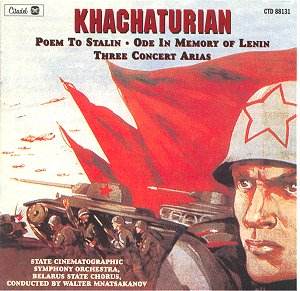ARAM KHACHATURYAN
Ode in Memory of Lenin (1948)
Poem to Stalin (1938)
Three Concert Arias (1944-47)
 Galina Boiko (sop) Belarus
State Chorus State Cinematic SO/Walter Mnatsakanov
Galina Boiko (sop) Belarus
State Chorus State Cinematic SO/Walter Mnatsakanov
 rec Moscow Feb 1996 CITADEL
CTD 88131 [55.25]
rec Moscow Feb 1996 CITADEL
CTD 88131 [55.25]

First impressions count. In this music the composer suffers a double blow.
Firstly the po-faced musical establishment would not forgive his worldwide
success with Sabre Dance (even made it into the USA's hit parade)
and violin concerto. Secondly he compounds the offence by writing in praise
of Lenin, and, of all people, Stalin! Whether he was a knowing Apparatchik
or naive music-centred innocent (latter theory favoured in Tom Null's excellent
notes) hardly matters now. It matters still less as time rolls by. What matters
is the music, allowing that compellingly memorable music can be written by
the self-serving or obsequious or the utterly evil just as much as by the
freedom fighter, the patriot, the dissident or the martyr. The same applies
to forgettable music unlit by even a flicker of imaginative invention.
I noticed recently some correspondence about Respighi. This had, as its aim,
to refute alleged links between Respighi, fascism and Mussolini. Whatever
the rights and wrongs (and, by the way, going by the number of denials one
wonders how defeated tyrants ever held sway anywhere) this type of discussion
is a musically irrelevant sideshow. It may be entertaining for the combatants,
interesting for the rest of us, perhaps crucial for historians and the composer's
family but for the rest of us the issue of political alignment and music
hardly matters at all. What matters is the impact a piece of music makes
when heard by a music lover who knows neither the name of the composer nor
perhaps the title. When we begin to disentangle our concerns about politics
and personal conduct from music we may allow ourselves to make some surprising
discoveries. The music of Nazi supporters Hessenburg and Trapp is worth hearing
and so is that of Alan Bush, Christian Darnton and a host of Russians who
embraced communism both before and after Hungary and Czechoslovakia.
And, after the harangue, soap box carefully put back under the stairs .....the
music.
The Khachaturyan Lenin Ode is among the most concise and least bombastic
of works. The title prepares you for the worst but while there is at least
one gaudy primal peak the rest is sincere, subdued and for Khachaturyan,
quite understated. The music began life as part of a film score. You can
cut the air with a scimitar in the brooding largo with its minatory brass
and cymbals and the storm is nicely coaxed in a prelude to what you expect
to emerge as the Phrygia theme from Spartacus. If you have
ther Vissarion Shebalin Lenin Symphony (Olympia) you might care to
compare the two works.
The Stalin Poem (1938) can be categorised with the symphony-ballads
of the early 1930s (the most famous being the Fourth Symphony of Lev Knipper
Poem of the Komsomol Fighter). It is the most substantial musical
structure on the disc. It is recognisably Khachaturyan with an emphasis on
central Asian exoticism. Velveteen music slips and slides like a sword from
and into an oiled scabbard. The deep 'Russki' brass (1.55) register with
hoarse power. A fast flute and clarinet dance whirls and spins with hazardous
allure. Rimsky's Antar symphony might be the Poem's grand uncle. Strings
deliver a sleepy evocation suggesting a cut-glass lake of strings. Skittish
fancy and excitement are there (16.33) and at 17.07 a Spanish phrase (Chabrier
rather than de Falla) is borne along on a repeated call of the strings. At
18.15 the carolling horns build the tensions ready for the concluding paean
(sung, thankfully, in Russian - although Citadel provide a full translation
side by side with the transliterated text). The chorus are strong, unanimous
and fervent of voice. The blocks of voices grouped by register sing in antiphonal
effect (great stereo separation here). The women are in excellent voice;
the men seem more recessed. The final bars sway snakelike - slow of pace
and lifted high with a filigree of woodwind-borne melody into exaltation.
After the politically inspired purple we come to the three songs. These are
available only on this disc as is also true of the Stalin poem. The songs
are really scenas for soprano with orchestra. They were written (1944-47)
when the composer was toying with writing an opera. The first may be heard
as an Armenian version of Summertime with a Moorish ululation in the
vocal line and a striking melody from the Ashugh minstrelsy. The piece looks
east towards central Asia and south towards North Africa. You might group
this song with the Infatuated Muezzin songs of Szymanowski and with
Bantock's Sappho Fragments.
Akhtamar (song 2) is a ballad tale (also the subject of a Hovhaness poem
for solo piano) in which the drama is taken by the orchestra. The evocation
of the night-time waters through which the doomed hero swims towards his
lover's island is vivid in its surging swell. The Dithyramb resounds with
the Borodin's Prince Igor music but with a more developed harmonic
palate. The bubbling song of the clarinet at 2.30 is memorable as are suggestions
of time passing and a certain sullen passion troubling the soul.
I rather liked the damask of Boiko's soprano voice which can also draw on
the contralto register when required.
A recommendable disc far too easily overlooked and a most acceptable companion
to ASV's complementary Khachaturyan series. Star rating only moderated by
modest playing time. Musical values high!
www.earthlink.net/~citadel
*******Soundtracks from Citadel and Bay Cities********
Jabberwocky Productions e-mail:
jabwocky@aol.com
P O Box 3269
http://members.aol.com/jabwocky
Santa Monica, CA 90408 FAX: (310) 829-9447
CITADEL and BAY CITIES catalogues at
www.earthlink.net/~citadel.
They will take direct orders.

![]()